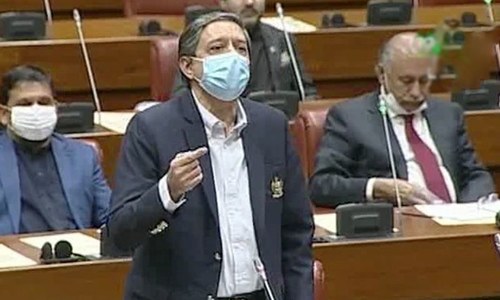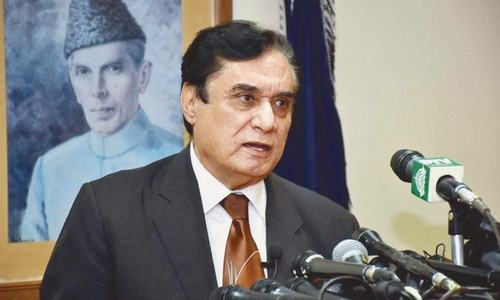National Accountability Bureau (NAB) chairman retired Justice Javed Iqbal on Tuesday once again defended the anti-corruption watchdog against allegations of bias and committing excesses, saying closing down NAB will only benefit the elite.
Speaking to a group of traders in Peshawar, Iqbal said NAB had always been the subject of a "nefarious propaganda" and allegations were levelled against it. "And the only basic reason for that was that people hadn't imagined even in their dreams that someone could ask them [about their wealth]," he added.
Iqbal said the accountability watchdog had recovered Rs487 billion ill-gotten money in a period of three years, while Rs2.5bn were recovered from a housing scheme by NAB Lahore and distributed among the affectees.
Editorial: NAB not impartial
Recalling that persons holding power in the past had suggested closing down the bureau, he said: "Should NAB be shut only because it asked you where you acquired these billions of rupees from?"
The NAB chairman said when persons suspected of misappropriating huge sums of money were questioned about them, their first response was accusing the bureau of "intiqami karwai" (acts of vengeance).
Iqbal said he had spent all his life in Balochistan and he was not familiar with most people whose cases were currently being heard. "So there is no question of [taking] personal revenge," he added.
The NAB chairman said he was also accused by critics of having political affiliations, adding that he wasn't aware what the term actually referred to.
"My personal interest and that of NAB is only with Pakistan," he said. "Closing down NAB will only benefit the elite or those millionaires who wanted to become billionaires but incidentally due to NAB that dream couldn't be fulfilled."
"That is why they were sad and shocked that there's an institution in Pakistan that can ask where these billions of dollars and rupees came from," he added.
Iqbal said when poor people were held accountable, then the elite should not be exempt from questions either.
"NAB's biggest crime is that it asked these people how they wasted away so much of the nation's money and the country's economy," he emphasised.
He said NAB was always held responsible for destroying the national economy, but noted that the bureau neither charged tax nor determined the interest rate and wasn't responsible for making other economic policies either. "So how can we impact the country's economy?" he asked.
"Some people tried to create a storm in a teacup that dozens of businessmen have migrated from here due to NAB. That is not why they left, some of them left only because power and gas were expensive and there was not enough water in the past. Now things are a lot better, law and order situation is better," the chairman said.
He told traders that the NAB had never asked anyone about where their investment came from and how they started their business, "but there is a difference between a genuine businessman and a dacoit".
"I can say with certainty there is no [other] institution in our country that could recover in Rs2.5bn in two years and distribute among [the affected] people, then recover another Rs2bn in 1.5 years and distribute among people," he said, adding that one of the bureau's biggest accomplishments was the record Rs1bn fine imposed in the Modarba case.
Iqbal continued: "I have assured genuine businessmen many times and I do that again that if businessmen progress, the country will progress and the economy will improve and common man's life will be improved."
He said NAB was not a policy-framing institution and worked according to the law. Additionally, no "coercive measures or third-degree methodology" was used to recover the billions of rupees reclaimed by the bureau and the accused themselves opted for plea bargains, he added.
He said even after an accused entered plea bargain, which was allowed by the law, they did not become guiltless. "You are a criminal [even after it] because you admit you've committed a crime; it's a separate thing that you sometimes say 'the conditions are such that we can only give Rs95 instead of Rs100'. If we use other tactics, then we might not be able to recover these Rs95 either," he added.
Iqbal stressed that plea bargain could not take place without court permission. He said NAB only did the calculations and estimated the loss caused to the exchequer, and then presented the case before the relevant court, which then approved a plea bargain.
"It is not a new phenomenon in Pakistan. It's present in every country where there are anti-corruption laws, so it is not an unusual thing," he said.














































